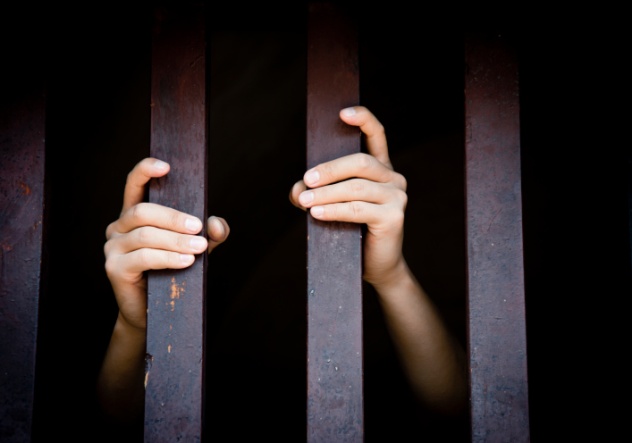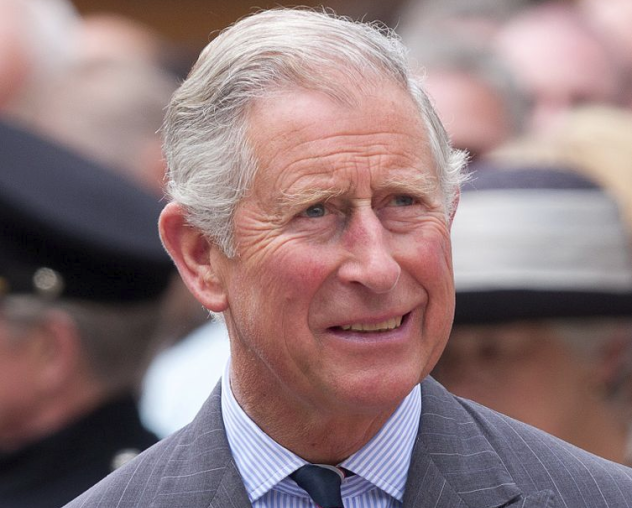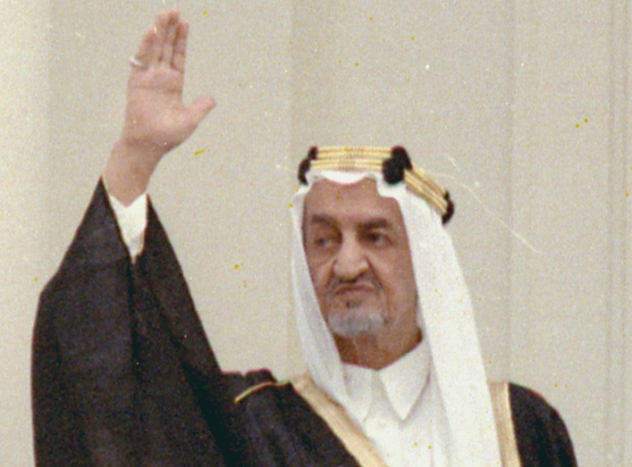 Our World
Our World  Our World
Our World  Crime
Crime 10 Dark Details of the “Bodies in the Barrels” Murders
 Animals
Animals The Animal Kingdom’s 10 Greatest Dance Moves
 Movies and TV
Movies and TV 10 Box Office Bombs That We Should Have Predicted in 2025
 History
History 10 Extreme Laws That Tried to Engineer Society
 History
History 10 “Modern” Problems with Surprising Historical Analogs
 Health
Health 10 Everyday Activities That Secretly Alter Consciousness
 History
History Top 10 Historical Disasters Caused by Someone Calling in Sick
 Animals
Animals 10 New Shark Secrets That Recently Dropped
 Movies and TV
Movies and TV 10 Forgotten Realities of Early Live Television Broadcasts
 Our World
Our World 10 Places with Geological Features That Shouldn’t Exist
 Crime
Crime 10 Dark Details of the “Bodies in the Barrels” Murders
 Animals
Animals The Animal Kingdom’s 10 Greatest Dance Moves
Who's Behind Listverse?

Jamie Frater
Head Editor
Jamie founded Listverse due to an insatiable desire to share fascinating, obscure, and bizarre facts. He has been a guest speaker on numerous national radio and television stations and is a five time published author.
More About Us Movies and TV
Movies and TV 10 Box Office Bombs That We Should Have Predicted in 2025
 History
History 10 Extreme Laws That Tried to Engineer Society
 History
History 10 “Modern” Problems with Surprising Historical Analogs
 Health
Health 10 Everyday Activities That Secretly Alter Consciousness
 History
History Top 10 Historical Disasters Caused by Someone Calling in Sick
 Animals
Animals 10 New Shark Secrets That Recently Dropped
 Movies and TV
Movies and TV 10 Forgotten Realities of Early Live Television Broadcasts
10 Sordid Stories Of The Saudi Royal Family
It’s a sad fact of life: Absolute monarchies generate more crazy stories than democratic republics. While the common people of the Saudi state are subject to strict rules and tender mercies of the religious police, the royal family are subject to no such restrictions and live lives of luxury and adventure. Instead, the biggest threats to the Saudi princes and princesses are often themselves.
10 Princess Basmah’s Fake Sheikh
Her Royal Highness Princess Basmah bint Saud bin Abdulaziz al Saud, the granddaughter of the first Saudi king and the daughter of the second, has long been a thorn in the side of the country’s rulers due to her liberal reformist outlook and human rights campaigning. She has publicly stated her wish that the kingdom would adopt a constitution ensuring gender equality and civil rights, reform of divorce laws, the education system, and social services to reduce discrimination against women, and getting rid of the mahram, a male chaperone who must accompany Saudi women in public.
Despite this, she still became a target for those who seek to bring down the ruling Saud dynasty. In 2013, she was allegedly tricked into a Facebook conversation with a hacker who had broken into the account of a personal friend, whom she refuses to identify but described a 30-year-old sheikh in the United Arab Emirates. Her Skype conversations with the fake sheikh were recorded, while he used flattery to try to lure the princess into sexually explicit conversations. She also claimed that her computer was hacked, with videos and photos stolen. After several months, the blackmailer revealed himself, demanding that £320,000 be sent to an Egyptian bank account.
The princess decided to go public instead, so the blackmailer released a 40-second video to YouTube showing the princess smoking and blowing a kiss with her head uncovered. While innocuous to Western eyes, this constituted a major scandal for Saudi society. She believes the blackmail plot is linked to the individuals behind the Mujtahidd Twitter account, a network of dissidents who publish intimate details of members of the royal family in order to destabilize the regime.
9 Prince Nayef’s Cocaine Plane

In 2004, Prince Nayef bin Fawwaz Al Shalaan was indicted in the United States and France for his involvement in a drug-dealing operation between South America and Europe. The scheme dates back to a love affair between the prince and a Colombian woman named Doris Mangeri at the University of Miami in the 1970s. They kept in touch and occasionally met over the years, with the prince even acting as a virtual surrogate father for her children. In 1998, the prince is alleged to have met with members of a Colombian drug syndicate introduced through Mangeri. The syndicate was headed by Juan Gabriel Usuga and Carlos Ramon, former brothers-in-law who had both lost an eye in accidents and were making millions in the drug trade. They shared a ranch outside Medellin, Colombia, which they called the Cyclops Cattle Ranch.
The prince allegedly proposed smuggling cocaine on his private Boeing 727 jet, then laundering money through a bank he owned, Kanz Bank, “the only Islamic private bank in Geneva.” The prince has a history with drugs and was once indicted in Mississippi on narcotics charges in 1984. The Colombians agreed to his plan, and 2,000 kilograms (4,400 lb) of cocaine was smuggled into a stash house in Caracas via potato truck, then transferred into 100 empty Samsonite suitcases, and finally placed aboard the prince’s plane. Moved to a Paris stash house, some of the cocaine was then shipped off to Italy and Spain. Unluckily for the conspirators, the Paris stash house and a Spanish shipment were intercepted by authorities. As they squabbled over blame, the Colombians found themselves arrested in the United States.
Despite the Saudi kingdom’s draconian policies against drug trafficking, the prince claimed his meetings with the Colombians were merely a search for investors for a plastics venture and was found not guilty by their courts. As there are no extradition treaties between the kingdom and either France or the United States, there wasn’t much that investigators could do. The Saudi interior minister, Prince Nayef bin Abdel Aziz, even threatened to cancel several French business deals if the narcotics investigation continued. Prince Nayef bin Fawwaz Al Shalaan remains in hiding. In court, Usuga claimed that he asked the prince why he wanted to smuggle drugs, and the prince replied: “The world is already doomed. [I’ve been] authorized by God to sell drugs.”
8 The Execution Of Princess Misha’al
This is one Romeo and Juliet story that ended just as badly as the original. Princess Misha’al bint Fahd al Saud was in an arranged marriage (by all accounts, an unhappy one) with an older cousin. She left for Beirut to pursue further studies. There, she met Khaled, the son of a Saudi diplomat, and began an affair. They maintained the affair back in the kingdom and finally attempted to flee the country together in 1977, but they were caught before they got very far. The princess refused to simply denounce her lover and confessed to the adultery, enraging her conservative grandfather, Muhammad bin Abdul Aziz al Saud, brother of the king.
She and her lover were taken to a parking lot in Jeddah, and 19-year-old Princess Misha’al was executed by a gunshot to the head while her lover watched. He would be dispatched by beheading, which was reportedly botched so badly that it took four strokes to complete. The Saudi authorities attempted to keep the whole affair quiet, but it caused international outcry in 1980 when it became the subject of a docu-drama entitled Death Of A Princess, broadcast on the BBC and PBS.
The Saudis responded by trying to suppress the film, and they failed. They retaliated by expelling the British ambassador to Riyadh, withdrawing 400 Saudi royals from Britain, and causing the UK £200 million in lost revenue from canceled orders and product boycotts. The film was rebroadcast in 2005 and is available to view in full online.
7 Royal Lockup

According to televised testimony by Princess Anoud al Fayez, one of the late King Abdullah’s numerous ex-wives, divorced by him several times, who now lives in the UK, King Abdullah kept the four daughters he had with her, Princesses Jawaher, Sahar, Hala, and Maha, under virtual house arrest in the Jeddah royal compound. They are said to have been under the control of three of their half-brothers for the past 14 years, a supposed punishment for racy lifestyles and criticism of the royal family. Others among the king’s daughters have had successful careers and even championed human rights, so why these four were singled out is something of a mystery.
The women, now in their thirties and forties, are locked up under terrible conditions. In an interview with RT last year, Princesses Hala and Maha claimed that they were running out of food and water. In an interview with an Arabic TV network, the princesses said that they are being held as punishment for their stance on women’s rights and opposition to male guardianship over women. The Saudi authorities have never charged them with a crime and refer to it as a “private matter.”
In an email with a Middle East current affairs site, Princess Sahar explained the dire nature of their plight:
We, along with our mother, have always been vocal all our lives about poverty, women’s rights and other causes that are dear to our hearts. We often discussed them with our father. It did not sit well with him and his sons Mitab and AbdelAziz and their entourage. We have been the targets ever since. We have been treated abysmally all our lives, but it got worse during the past 15 years. When Hala began to work as an intern at a hospital in Riyadh, she discovered political prisoners thrown in psychiatric wards, drugged and shamed to discredit them. She complained to her superiors and got reprimanded. She began to receive threatening messages if she didn’t back off. The situation deteriorated, and we discovered that she was also being drugged. She was kidnapped from the house, left in the desert, then thrown in Olaysha’s Women’s Jail, Riyadh. She soon became yet another victim of the system, as were the so-called patients (political prisoners) she was trying to help. Maha, Jawaher and I have all been drugged at some point . . . We have been told to lose all hope of ever having a normal life.
6 Halloween At Faisal’s

Halloween is banned in the Saudi kingdom, as are most foreign holidays, for their “un-Islamic” nature. Every October, shopping malls are patrolled by religious police on the lookout for outlets selling costumes. But this prohibition doesn’t extend to the royal family. According to US diplomatic cables released through Wikileaks, there is a wild party scene in Jeddah under the protection of Saudi princes.
In 2009, Prince Faisal al Thunayan held an underground Halloween party at his residence, inviting over 150 young Saudi men and women. Prince Faisal is a Cadet prince, meaning that he is not in line for the throne but still enjoys all the protection and perks of being a member of the royal family. The religious police were kept at bay by khawi, young Nigerian bodyguards of a similar age who grow up with their princes and serve for life and are considered utterly loyal.
Despite Saudi prohibitions on alcohol, Filipino bartenders served a cocktail punch made from sadiqi, a local moonshine. Top-shelf liquor bottles filled with sadiqi were on display. The event, co-sponsored by US energy drink company Kizz-me, featured dancing, costumes, and a DJ. The American consulate officials attending the event heard by word of mouth that many of the female guests were actually prostitutes hired for the event and also that cocaine and hashish use is common at these kind of parties. While only a few years ago, the only nightlife for rich Saudis in Jeddah was informal “dating” in private residences, today, many royal residences have basement bars, discos, entertainment centers, and clubs catering to a growing appetite among the young elite for Western-style nightlife options.
5 The Death Of Bandar Abdulaziz

In 2010, Prince Saud bin Abdulaziz bin Nasir al Saud was arrested for beating his manservant and gay lover, Bandar Abdulaziz, to death in an expensive London hotel room. The death is said to have come after weeks of physical and sexual abuse at the hands of the prince. Finally, on Valentine’s Day, in a rage fueled by champagne and “sex on the beach” cocktails, Mr. Abdulaziz was beaten 37 times and bitten on both cheeks. He died as a result of his injuries.
After the attack, the prince ordered glasses of milk and water, dragged the corpse into the bed, and tried to clean up the blood in a failed attempt to cover up his crime. The prince spent most of his trial trying to prove he was not gay, as homosexuality is punishable by execution in Saudi Arabia. However, one expert on Saudi Arabia noted that most executions for homosexuality in the kingdom were linked to rape charges, and as a member of the royal family, the prince was unlikely to suffer capital punishment.
Others believe that the concealment was motivated more from a desire to obscure the sexual element in the crime. The prince and Abdulaziz seemed to have been in a committed but abusive relationship. They went shopping, dined, and stayed together in the best hotels, but the prince subjected his manservant and lover to frequent violent attacks. One such assault, caught on a parking lot CCTV camera, showed Mr. Abdulaziz submitting to a beating and then meekly following his master as he walked off.
The prince attempted to claim that the death was related to a supposed incident where Mr. Abdulaziz was beaten up and robbed of 3,000 euros several weeks earlier, but forensic evidence proved that the wounds were more recent. The prince was convicted and jailed for life but was sent back to Saudi Arabia in 2013 as part of a prisoner exchange deal to allow five Britons languishing in Saudi jails to serve their sentences at home.
4 Prince Turki And Princess Hind

In 1973, Prince Turki bin Abdul Aziz married beautiful 20-year-old Hind al-Fassi (daughter of a Sufi mystic barred for religious reasons from entering the Saudi kingdom) over the objections of his family. He divorced his first wife in the process. For nine years, they traveled the world with Hind’s mother, sister, and brothers, Mohammed, Allal, Mustafa, and Tarek, as well as a large entourage. They lived a lavish and outlandish lifestyle and caused scandal and headlines wherever they went with their unrestrained spending and wild parties. They eventually settled down in a North Miami condominium, the Cricket Club, overlooking Biscayne Bay.
They went there at the urging of Alvin Malnik, a multimillionaire Jewish lawyer with mob connections whom they had met while staying in London. He had charmed Hind’s brothers with his dashing and adventurous image and quickly managed to take control of the prince’s finances. Various chaos involving the al-Fassi brothers ensued. Mohammed, jealous of Malnik’s power, went to Turkey and adopted a young boy and then dumped his Italian girlfriend to marry a Saudi girl, all apparently in a failed attempt to impress his brother-in-law. Seventeen-year-old Tarek kidnapped a young Saudi woman in a London discotheque, proposed to her, and made a cash offer to her husband to divorce her. Malnik’s son, Mark, fell in love with Hind’s sister. The move to the United States was intended for Malnik to finally sort everything out.
Miami had an effect on the al-Fassis, who discovered that it was the perfect city to host their lavish and rambunctious lifestyles, despite trouble with the neighbors and disastrous real-estate schemes. Trouble started to emerge in 1982, when newspaper articles alleged that servants on the prince’s compound were being forced to work 24/7 at punishingly low pay while being prevented from leaving or contacting the outside. A warrant was issued, and a dozen police officers arrived with an interpreter in tow. A shouting and shoving match ensued between the officers and Princess Hind and the bodyguards. During the fracas, the princess’s mother, in the bathroom, asked a police officer to pass her a towel through the door. When he did so, she bit him on the arm.
Lawsuits and counter-suits raged between the police and the prince, who eventually got off due to diplomatic immunity, hastily organized by the State Department and the Saudi ambassador. The family was ordered to return to the kingdom, but it wasn’t long before the prince and his entourage relocated again to Egypt, where they took over the top three floors of the Ramses Hilton. The Cairo press in the 1990s was filled with lurid stories of servant beatings and thuggish bodyguards. Two Egyptian waiters fell from the hotel while trying to escape down the side of the building with tied bedsheets. Hind became notorious for refusing to pay a local jeweler thousands of dollars that she owed and for entertaining male guests, including well-known Arab singers, while Prince Turki was passed out from prescription medications, prescribed to him by his domineering wife.
3 Phoney Dinner For Prince Charles

According to Wikileaks, in 2006, US Consul General Tatiana Gfoeller wrote a cable detailing a disastrous dinner held by Prince Khalid bin Faisal al-Saud for the visiting Prince Charles. The two princes have a history, sharing a love for landscape painting and even holding an art exhibition together in London and Riyadh. Prince Khalid was said to be nervous about hosting a party for Prince Charles, as his palace was run-down and in dire need of renovation. The entire meeting had been organized by someone described as a “prominent Western businessman,” who was then told by Prince Khalid that it was his responsibility to renovate the ground floor of the palace. When the businessman asked if he could decline, he was given an emphatic “no.”
The businessman did his best with the three weeks of time that he had. First, he cut power to the place, so no one could turn on the lights and see what was up. Holes in the walls were filled with Styrofoam, and projectors were set up to project colors and designs onto the walls. The whole dinner was to be lit only by candles, to further obscure the hasty renovation job. The ruse worked; Prince Charles commented on how luxurious and beautiful the palace was, and the businessman was rewarded with paintings from both of the princes and a “tip” of over $13,000. The businessman was also quoted in the cable for describing Prince Khalid as being “extremely cheap.” This record of stinginess took on new significance when Prince Khalid became governor of Mecca, and there were speculations he could be tapped for the throne.
2 Rape At The Plaza Hotel

In 2010, Prince Abdul Aziz bin Fahd was enjoying his opulent and carefree lifestyle at New York’s Plaza hotel. He was staying in a 370-square-meter (4,000 ft2) fourth-floor suite, while members of his entourage occupied 50 rooms in the Plaza and nearby hotels. The prince and his entourage had been staying at the Plaza, partially owned by a royal cousin, for four months when one of his men, Mustapha Ouanes, raped a young barmaid who had fallen asleep in his room. Mr. Ouanes, a mechanical engineer in the employ of construction and telecommunications company Saudi Ogere, was tasked with modifying the climate-control system in the prince’s suite to match his tastes.
On January 26, 2010, Mr. Ouanes met a 26-year-old barmaid and her friend at a bar in the West Village; they shared drinks there and at another bar. The victim left to smoke hashish with another friend, and after she returned, the three went to Ouanes’s two-room suite to share breakfast. Incapacitated by alcohol and hashish, the two women passed out, only to awaken to discover Mr. Ouanes raping the victim. In the trial, the defense claimed that the women tried to make Ouanes pay them for sex, concocting a rape story for a lawsuit and cash payout only after he refused.
Plaza employee Nizar Adeeb testified that when police arrived, he went up to the suite, where one of the women, very upset, shouted at him, “Do you work for the prince, too?” As police took Mr. Ouanes away, Adeeb gave him a $100 bill to take with him and covered the handcuffs with a coat: “The concern was the Plaza’s reputation, more than the client.” Ouanes was convicted and sentenced to 10 years in prison. The judge dismissed an attempt by the defense lawyer to have the jury’s verdict overturned in the light of 61-year-old Mr. Ouanes’s coronary artery disease and supposed worsening health.
1 The Assassination Of King Faisal

In 1975, popular Saudi Arabian King Faisal (pictured above) was assassinated by his nephew, Prince Faisal Ibu Musaed. King Faisal had been known for his modernization drive, close ties with the United States, and support for pan-Islamism and conservative forces throughout the Arab world. On March 25, 1975, the king was sitting in his majlis, meaning “a place for sitting,” an event where the king opened up his residence to hear petitions from citizens. Outside, the prince chatted with Kuwaiti representatives, who were also waiting for an audience with the king. King Faisal emerged, and the prince rushed to embrace him, the king bending forward to kiss his nephew’s head as is Saudi custom. The prince then shot three times, hitting the king in the chin and the ear. A bodyguard then hit him with a sheathed sword as Oil Minister Zaki Yamani shouted at him not to kill the prince.
The king was rushed to a hospital, where doctors massaged his heart and gave him a blood transfusion but could not successfully save him. It is said that the king’s dying wish was for the prince to be spared. The prince’s brother, Khalid, took the throne by agreement of the Saudi royal family, and the capital shut down completely for three days of mourning. Prince Faisal was declared insane, but a panel of Saudi medical experts determined that he was sane at the time of the assassination. He was found guilty of regicide by the high religious court and executed by beheading in a public square at the Al Hukm Palace (Palace of Justice) in Riyadh in front of thousands of onlookers.
There were conspiracy theories related to the assassination, but it was determined that Faisal acted alone. One motive may have been a revenge killing for the death of Prince Khalid bin Musa’id. King Faisal had recently introduced television to the kingdom, which had provoked a violent reaction in some quarters. Prince Khalid bin Musa’id had been killed by a policeman while leading an attack on a television station.
David Tormsen has his own ways of dealing with the end of this year’s season of Game of Thrones. Send invitations to Jeddah Halloween parties to [email protected].








